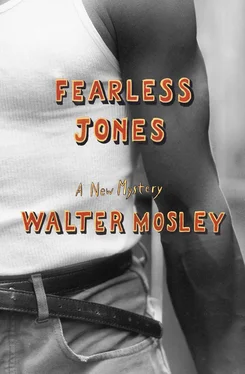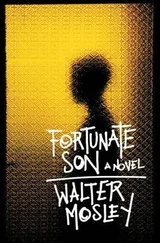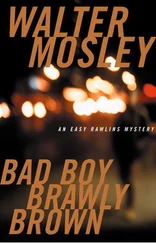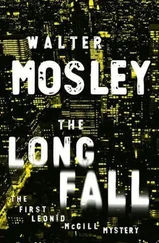Walter Mosley - Fearless Jones
Здесь есть возможность читать онлайн «Walter Mosley - Fearless Jones» весь текст электронной книги совершенно бесплатно (целиком полную версию без сокращений). В некоторых случаях можно слушать аудио, скачать через торрент в формате fb2 и присутствует краткое содержание. Жанр: Старинная литература, на русском языке. Описание произведения, (предисловие) а так же отзывы посетителей доступны на портале библиотеки ЛибКат.
- Название:Fearless Jones
- Автор:
- Жанр:
- Год:неизвестен
- ISBN:нет данных
- Рейтинг книги:4 / 5. Голосов: 1
-
Избранное:Добавить в избранное
- Отзывы:
-
Ваша оценка:
- 80
- 1
- 2
- 3
- 4
- 5
Fearless Jones: краткое содержание, описание и аннотация
Предлагаем к чтению аннотацию, описание, краткое содержание или предисловие (зависит от того, что написал сам автор книги «Fearless Jones»). Если вы не нашли необходимую информацию о книге — напишите в комментариях, мы постараемся отыскать её.
Fearless Jones — читать онлайн бесплатно полную книгу (весь текст) целиком
Ниже представлен текст книги, разбитый по страницам. Система сохранения места последней прочитанной страницы, позволяет с удобством читать онлайн бесплатно книгу «Fearless Jones», без необходимости каждый раз заново искать на чём Вы остановились. Поставьте закладку, и сможете в любой момент перейти на страницу, на которой закончили чтение.
Интервал:
Закладка:
That event was learning to read.
I entered school at the age of six. It was a country schoolhouse with two teachers and four rooms. They broke us up among the classrooms according to size at first, and then they shuffled us around depending on ability. The fourth room was for study; children went in and out of there at the teachers’ request. On the first day I heard Miss Randolph read a story, and I knew that books were my destiny, not writing or teaching or inventing spaceships, just reading and reading and reading some more. I could pick out a simple sentence based on the knowledge of a dozen words by the end of the first week. By the age of eight I was alone in the fourth classroom, reading everything I could. I read the Bible and the dictionary and every newspaper I could. I read every book in our whole neighborhood by the time I was fifteen.
There was a library in the white part of town; coloreds couldn’t go inside. For a while I would go there and sit out front on the bench they had, rereading old books like The Hinkley Reader and Uncle Tom’s Cabin. One day the librarian, an old battle-ax named Celestine Dowling, came out and asked me what I was doing.
“Readin’,” I said proudly.
“Really,” old Miss Dowling said.
“Yes’m,” I replied.
“I don’t believe you,” she stated.
I didn’t know what to reply to such a rude comment, so I sat tight and quiet.
“Read me a sentence,” she ordered.
There is nothing worse than the snows of May, I read from a story called “Minnesota Snows.”
Dowling frowned and said, “Go on.”
I read the first page and then the second. I read all the way through the story. I had read that book many times and so did not skip or stutter hardly at all.
When I was through, Miss Dowling said, “Come on with me.”
She led me through the big double doors of the library into a large room that was at least twenty feet high, lined to the ceiling with shelves that were packed with neat rows of books. I remember my heart catching. I forgot how to breathe altogether. I had no idea that there were this many books in the whole world. There was a big oak table in the center of the room with fancy chairs around it. There was a podium with a proper Webster’s open to some page. The dictionary I’d read was just a small abridged thing that contained words a child might need to know.
“This is the library,” the librarian said.
I nodded and gulped.
“Close your mouth, boy.”
“It’s beautiful,” I said finally. “I never seen nuthin’ like it.”
“Of course you haven’t,” she said. “And do you know why?”
“Because I never been in here before?” I asked, not understanding the question.
“No,” she said from some Olympian height. “It is because this is a white library. And no matter how much you know how to read, these books are not meant for you. These books were written by white people for white people. This is literature and art and the way our country is and should be. There will be no library card for you, so you can stop sitting out in front. You have seen as much of this building as you ever will.”
The impact of her words brought tears to my eyes. I was thirteen, but, like I said, I’ve always been small. I looked up at Celestine Dowling, and she seemed pleased to see me cry.
“Go on now,” she said.
I went home in tears. My mother asked me what was wrong, but I was too sad to say. I cried that night and all the next day. Celestine Dowling had broken my heart out of a meanness that I couldn’t understand. Why would she hate me for being able to read well? I wasn’t hurting her. I would have been glad to check out books from the back door or window. I wouldn’t’ve treated those books badly.
All of the happiness flowed out of me then. For months I moped around. I made money reading contracts and warranties for my neighbors, but every time I’d read a line I’d remember the high shelves of that country library.
By the time I was seventeen I was on a train bound for San Francisco, not because I wanted to vote or was afraid of being lynched. I left because a man told me one night that in California black folks could go into any library they wanted. They could get library cards and check out books from here to Sunday.
It was cold in Frisco, but I read a book a day in the first year. Libraries still make my heart race. There is nothing like a book.
“I understand you, sir,” a voice agreed.
I smiled in my doze, thinking that most people thought I was crazy when I told them that story. A door closed and I was jarred awake. Three men stood in the shadows down the street in front of the curtained church.
Some more words were spoken, but I didn’t understand them. This made me think that I had given meaning to the words I heard in my sleep. Through the darkness I could tell that one of the men was white and the other two were black. One black man was well built, wearing a white suit. He laughed and slapped the white man on the shoulder. That was William Grove. I remembered him going into the church with all of the deacons shaking his hand as he went past. The other black man seemed to be older. He also wore a suit, but it was shapeless, fitting the man like the everyday uniform of a night watchman or usher.
The white man was powerfully built too. That’s really all I could tell about him, except that he seemed to have some kind of foreign accent. They talked briefly, and then a dark-colored sedan drove up. The white man got in, and the sedan drove off.
I crouched down as the sedan went past. When I rose partway up again, the black men were still talking.
They talked for a while more, and then Grove walked away down the street. The older man used a key in the front door to the church and went in.
I had brought myself to the edge of that minefield by asking a couple of good questions and by perseverance. But every step from then on was laid out for a better man than I was. So I sat there trying to will myself up the evolutionary ladder from man to superman. But when I got out of that car, there was no cape dragging behind me, only a tail between my legs.
14
I NEEDED TO RELIEVE my bladder, but I was scared. In a car I was an even match for Leon Douglas; on foot gawky Gella Greenspan had about equal odds to kick my ass.
I knocked on the church door, braced by the cold air and the possibility of finding a toilet. I was standing there for quite a while before a baritone voice asked, “William?”
“It’s Tyrell Lockwood,” I said, loud and clear.
“What you want?”
“I came to speak to Reverend Grove.”
“It’s three in the morning,” the opera voice informed me.
“It’s very important,” I said. “About a woman named Elana Love.”
There was a moment of silence, and then the lock snicked and cracked. The door came open and a frosty-headed older gentleman looked at me with a deeply furrowed brow.
“What about Sister Love?” he asked.
“She hired me to find you, said it was somethin’ important she had to say.”
“What?” His features were African Negro with very little other racial influence. Based on his facial structure you would have expected his skin to be dark, very dark, but instead it was fifty-fifty, coffee and cream.
“I’m sorry, sir,” I said. “But my business is with Reverend Grove. I spent the whole night driving around trying to find this place and I got to go.”
“I’m Vincent,” the man said warily. “Father Vincent la Trieste. At one time I was the minister of this congregation.”
“May I use your facilities, Father Vincent?”
There was a moment when he might have refused me, but then he stepped back, allowing me in.
Читать дальшеИнтервал:
Закладка:
Похожие книги на «Fearless Jones»
Представляем Вашему вниманию похожие книги на «Fearless Jones» списком для выбора. Мы отобрали схожую по названию и смыслу литературу в надежде предоставить читателям больше вариантов отыскать новые, интересные, ещё непрочитанные произведения.
Обсуждение, отзывы о книге «Fearless Jones» и просто собственные мнения читателей. Оставьте ваши комментарии, напишите, что Вы думаете о произведении, его смысле или главных героях. Укажите что конкретно понравилось, а что нет, и почему Вы так считаете.












